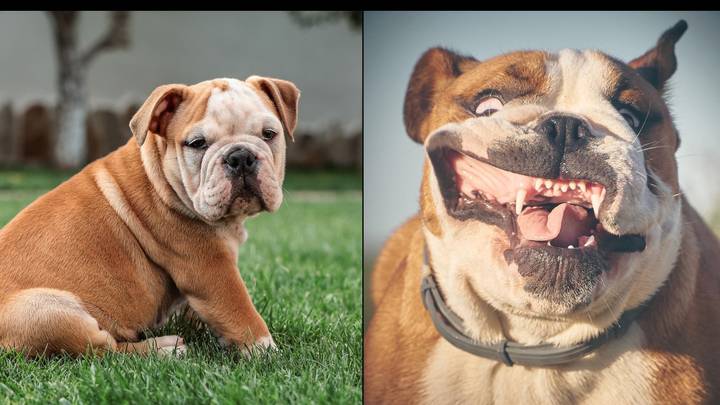Experts warn that if bulldogs are not developed to be healthier, they may be outlawed.

According to experts from the Royal Veterinary College (RVC), if bulldogs’ shape is not changed to prevent a variety of crippling illnesses, breeding of the dogs could be outlawed in the UK.
English bulldogs, who are associated with Sir Winston Churchill and being British, are known for having extreme physical characteristics such as shorter muzzles, folded skin, and squat bodies, which put them at risk for breathing, eye, and skin disorders.
The breed’s current low lifetime of eight years is partially caused by health issues, and the report advises consumers to “stop and think” before purchasing one.
The results revealed that they were over 38 times more likely than other dogs to develop skin fold dermatitis, nearly 27 times more likely to develop “cherry eye,” more than 24 times more likely to have a protruding lower jaw, and nearly 20 times more likely to have obstructive airways that resulted in breathing difficulties.
The renowned breed is also noticeably more prone to foot infections, rolled-in eyelids, dry eyes, mange, and cysts between the toes.
In order to protect their health and avoid having their breeding prohibited, the study, which was published in the journal Canine Medicine and Genetics, recommends that English bulldogs be developed to have more moderate physical attributes.
With a small skull, protruding mouth, skin folds, and a squat, hefty body, the breed was once created as an athletic and strong dog for bullfighting. Today, it is produced as a show and companion animal.
English Bulldog breeding has recently been prohibited in numerous nations, including the Netherlands and Norway, because to the association between this breed and a number of health issues.
“Every dog deserves to be born with equal and good innate health by having a natural ability to breathe freely, blink fully, exercise easily, have healthy flat skin, mate, and give birth,” stated study author Dr. Dan O’Neill, associate professor of companion animal epidemiology at the RVC.
“The public has a big role to play by demanding dogs with reasonable and healthier conformations, especially for breeds like English bulldogs where many dogs still have extreme conformations with poor intrinsic health.
“Until then, prospective owners ought to give purchasing a flat-faced dog some thought.”
“These results imply that the English bulldog’s general health is significantly worse than that of other dogs,” he continued.
What is most alarming, though, is that a great deal of the health issues that English bulldogs face—like skin fold dermatitis and respiratory issues—are directly related to the extreme physical characteristics of their bodies that have been carefully selected for.
“Considering the breed’s ongoing popularity, the standard English bulldog pet’s body type should be revised to emphasise more moderate physical attributes.
“By doing this, the UK may be able to avoid following other nations in outlawing the English bulldog for welfare concerns, in addition to improving the health of the dogs.”
By using the VetCompass database to analyse records from veterinary practices across the UK from 2016, researchers were able to compare the risks of common illnesses in English bulldogs to those in other dog breeds.
They discovered that English bulldogs had a twofold higher likelihood of receiving a diagnosis of at least one condition when compared to other dogs, based on a random sample of 2,662 English bulldogs and 22,039 dogs of other breeds. Of the 43 particular illnesses, the breed shown predispositions for 24 of them.
Additionally, they discovered that whereas 25.4% of other dog breeds in the survey had canines eight years of age or older, just 9.7% of English Bulldogs met this requirement. According to the experts, this provided evidence in favour of the theory that English bulldogs’ shorter lifespans are caused by general health issues.
“Around 1900, some bulldog breeders were already concerned that the exaggeration of ‘certain typical points’ was ‘intensifying predispositions to disease’ and producing ‘cripples and deformities’ with ‘a sadly shortened duration of life,'” according to co-author and veterinary historian Dr. Alison Skipper.
“This new research offers compelling evidence that numerous diseases associated with modern bulldog body shapes—the majority of which have been known about for over a century—continue to plague these dogs.
“To improve the welfare of this well-known and iconic breed in the future, it reinforces the need to follow the example of more responsible breeders that prioritise health in breeding decisions.”
The writers expressed their hope that the English bulldog, with its longer face, smaller head, and smooth skin, will one day be acknowledged and adored as a symbol of a more balanced and healthful conformation.
Experts noted that the public, who can demand and buy only those breeds of dogs with moderate and healthy builds, possesses the true power to effect change, since an estimated 70% of dogs in the UK are not registered with The Kennel Club and only a small percentage of them have ever attended dog shows.
Breeder services executive at The Kennel Club Bill Lambert stated: “This research indicates that a growing number of bulldogs are bred outside any sphere of influence and in a particular way because it is thought to be ‘cute,’ with little regard for health and welfare.”
The Kennel Club Charitable Trust has provided partial funding for this research, which helps us and everyone else concerned with enhancing bulldog health get a better understanding of these intricate problems.
“Those reputable breeders and caring owners who use evidence-based tools have made progress to improve and protect bulldog health.” “Careful, responsible breeding can help address health problems.”
